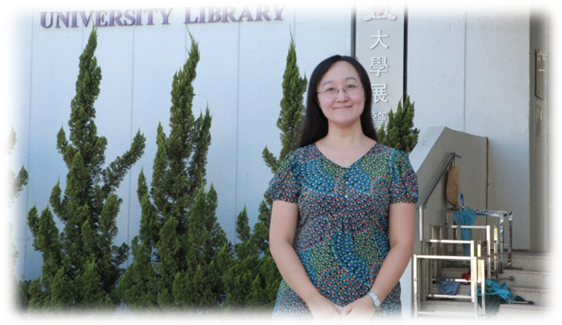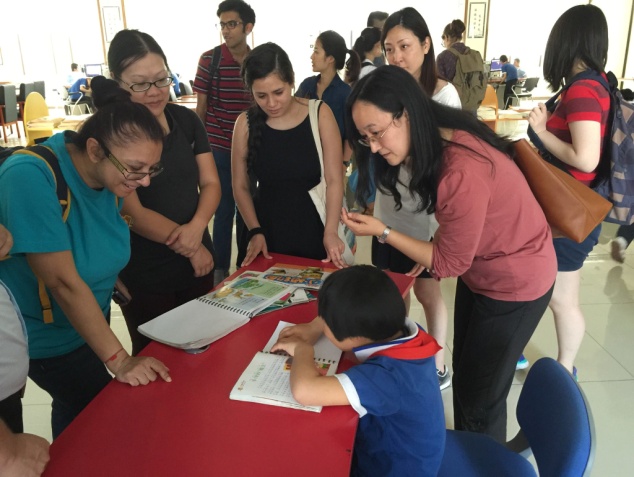PEOPLE |
|
Ms. LIU Zhen Xia Division Head of Putonghua Programme Division, University Programme Section
|
 |
Editor’s note: Liu laoshi joined the CLC team in 2005 after leaving Beijing for Hong Kong. She took up the division head position in 2013. She is a pioneer of PRINCH Bejing, a total immersion programme, and is one of the head teachers there. In this issue of PEOPLE, Liu laoshi who beams and speaks sweetly is going to share with us her little stories.
PROFESSION
1.
Why interested in Russian language and culture?
My first acquaintance with English took place when I was a primary four to five school kid. Since then, I have found learning a foreign language is fun. By chance, I was admitted to Shandong University for undergraduate study in Russian language. Throughout the 4 years study, I had discovered that Russia is a country with a profound cultural foundation and a big wealth of literature and fine art heritage. I wanted to understand more. On the other hand, through the interaction with Russian professors in my study, I came to realize that cross-cultural exchange is something meaningful. Eventually, I chose Russian Culture as my research direction during my master study in Peking University.
2.
What are the distinctive features of
Russian language? How is it different from Chinese and English?
This cannot be clearly explained in a few words. Chinese language belongs to Sino-Tibetan language family. It is completely different from western languages. So, I am not going to talk more about the difference between. Russian and English are classified similarly under the Indo-European language family. Although the characters used in the two written languages are different, association in some words could be found. For example, the number “ 3”. In Russian, it is“три”. If you are familiar with the corresponding relationship between the letter sound of both languages, you will discover that it is very close to“three” in English. Certainly, this kind of words is just a small portion. Russian and English within the Indo-European language family belong to Slavic and Latin divisions respectively. Their syntax is very different too. I here illustrate with a simplest example. In Russian, the form of a verb changes according to the change of subject. Such as the basic form of the verb“eat” is “есть”. The corresponding verb form for “I eat”, “you (singular) eat”, “he/ she eats”, “we eat”, “you (plural) eat” and “they eat” is “ем”, “ешь”, “ест”, “едим”, “едите” and “едят” respectively. This phenomenon is called“conjugation”, which does not exist in English. (The noun and its modifier numerals, pronouns and adjectives in Russian language, all have their forms change according to the word’s purpose within the sentence. This kind of“declension” phenomenon is different from English as well.)
3. The path leading to your first Chinese teaching career in Tsinghua
University.
BACKGROUND & HOBBIES
4.
Born in Cangzhou, studied in Jinan and Beijing, how the 3 places differ?
I can say the 3 places are very
different. Cangzhou is a small city located at a plain in Northern China. It
is close to Beijing and Tianjin and easily accessible. Apart from that,
there is nothing distinctive from the thousands of small cities and towns in
mainland China. That is the place where I grew up. It is the most intimate
and special in my heart forever. If talking about distinguishing feature,
those who like famous Chinese novel “Water Margin” may remember that Lin
Chong, the “Panther Head”, is exiled to Cangzhou for
penal servitude.
Jinan is the
provincial capital for Shandong Province and having an essential position in
the Chinese history. Noted Chinese novelist Mr. Lao She lavished in ink and
pen by writing several proses to portrait Jinan, including the one enjoyed
great popularity “The Winter in Jinan” and the one covered by mainland China
formal education language curriculum textbook“Baotu
Spring”. In my impression, Jinan is a picturesque medium size city with
simple folkways. The 4 years I spent there can be considered the most
peaceful time in my heart throughout my green years.
5.
Your sparetime and hobbies.
The work in the
Centre is quite heavy. Somehow I could not think of “sparetime”. Teacher is
a special profession. Behind the 45 minutes on the lecture theatre is 2 to 3
hours or even 2 to 3 days preparation. Before my child is born, I spent all
of my vacation for“home
return” to see the cities I familiar with. In Beijing, I visited my friends.
In Cangzhou, to return to my parents’ side and being pampered like
“children”. For short holiday or any other time that work is not required, I
like going somewhere in Hong Kong and to acquaint myself more the place I am
living.
TEACHING & LEARNING
6.
Some impressive students
During academic year 2008 to 2009, I taught Cui, a local Putonghua student
who had visual impairment. That was my very first time came into contact
with students with special education need. Whenever the lesson required
Pinyin (Putonghua Romanization) recognition and read aloud, he asked
classmates to tell the English letter sound, and then he read out the
Putonghua sound in Pinyin. He completed the quizzes and exams by borrowing
special equipment from the university library to magnify the words. I was
moved by his earnest and diligence amid tremendous inconvenience in his
learning process.
This summer in Beijing PRINCH, another student struck the deepest of my
heart. Tsang’s eyes cannot see. Her hearing is weak. But she is strong,
optimistic, painstaking in everything and harsh to herself. Throughout the
14 days in Beijing, without worrying of toil she followed the main group and
walked through the streets and alleys there. She even climbed up to the
Great Walls. She used her two hands and ears, coupled with her boundless
imagination, to feel all what we watched with our eyes. She completed
brilliantly all the course requirement and gave high quality final report.
There are so many valuable things I could learn from her.
During 2009 to 2011, I was teaching in the Putonghua Division of the
Continuing Education Section. The students there were very different from
university exchange students. Many students were having personal stories
behind. I still could remember the first report given by Fan, a Russian
student, who had learned Putonghua for just 2 months by that time. She could
use limited vocabularies and sentences to compose a story about her Kungfu
learning with Jackie Chan. Teachers and students were totally surprised and
amazed. In the term end report, she even wrote the sequel of the story and
gained the tremendous applause from the class.
Tang from South Africa was another student who had imprinted in my memory.
She is pretty and elegant and she likes singing and playing piano. I saw a
glimpse of her in a local TV programme where she was in a local primary
school lesson. In the forum, she received praise highly from many local
parents, including some towards her learning of Putonghua in CUHK and her
enterprising and positive attitude. I am really glad for her.
7.
Commonly seen learning patterns and Chinese language mistakes among
international students
It is quite difficult to classify
learning characteristics based on “countries”. Every student is unique. If I
have to tell an overall impression, I can say American and European students
tend to be more
“talkative” and are willing to express their
opinion. For Japanese and Korean students, they have a relative advantage in
Chinese characters. Their ability in reading and writing seems better. As
for learning method and style, every student is not exactly the same.
8. What kind of programme is PRINCH? Who is suitable to study?
9.
Academic plan for upcoming 1 to 2 years
In recent years, there are more and
more advanced level students. This can be found among some CUHK
international students whose Chinese proficiency is quite high and Chinese
language is still their compulsory subjects. So, the work focus for upcoming
1 to 2 years will be the development of this kind of curriculum and learning
materials. E-learning is another area Putonghua division wants to explore.
How to utilize e-learning platform to complement teaching and to enhance
classroom efficiency will be the area of focus.
|
|
| Ms. LIU Zhen Xia and international students from the Continuing Education Putonghua Division visited a local school in Beijing during PRINCH, and exchanged with teachers and students there. |
About Us
| Contact Us
| Privacy
|
Disclaimer
Copyright © 2016.
All Rights Reserved. The Chinese University of Hong Kong.

